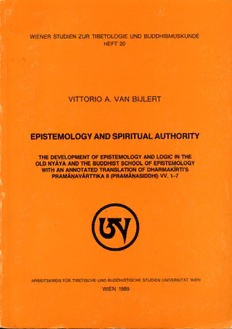
Epistemology and Spiritual Authority - The development of epistemology and logic in the old Nyaya and the Buddhist school of epistemology PDF
Preview Epistemology and Spiritual Authority - The development of epistemology and logic in the old Nyaya and the Buddhist school of epistemology
WSTB 20 WIENER STUDIEN ZUR TIBETOLOGIE UND BUDDHISMUSKUNDE HERAUSGEGEBEN VON ERNST STEINKELLNER HEFT 20 WIEN 1989 ARBEITSKREIS FUR TIBETISCHE UND BUDDHISTISCHE STUDIEN UNIVERSITAT WIEN VITTORIO A. VAN BIJLERT EPISTEMOLOGY AND SPIRITUAL AUTHORITY THE DEVELOPMENT OF EPISTEMOLOGY AND LOGIC IN THE OLD NYAYA AND THE BUDDHIST SCHOOL OF EPISTEMOLOGY WITH AN ANNOTATED TRANSLATION OF DHARMAKIRTI'S PRAMANAVARTTIKA II (PRAMANASIDDHI) W. 1-7 WIEN 1989 ARBEITSKREIS FUR TIBETISCHE UND BUDDHISTISCHE STUDIEN UNIVERSITAT WIEN Preis: OS 230,- zu beziehen von: Arbeitskreis fur Tibetische und Buddhistische Studien Maria Theresien-Stra|3e 3/4/26, 1090 Wien, Austria PREFACE This book was previously brought out as a PhD-thesis entitled "The Buddha as a Means of valid Cognition". Originally it had been my intention to add new findings to this edition, findings concerning the beginnings of Indian epistemology and logic, such as are found scattered in various texts antedating the Nyaya Sutra, as well as further discussion on the interpretation of Buddhist logic. But certain technical problems and the bulk and nature of the new material prevented me from adding much to the present text. They will appear in a separate publication. Printing errors have been corrected as far as possible, although I am sure that some have escaped notice, for which I ask the indulgence of the reader. Certain numberings in the index will at first sight seem rather erratic, this is due to technical problems, but if the numbering is read in a specific mathematical order, the text-place can be easily found. It remains for me to express my gratitude especially to the following persons who have contributed greatly to the making of this book: Dr. T.E. Vetter, Dr. J.C. Heesterman, Leiden, and Dr. E. Steinkellner, Dr. G. Oberhammer and their pupils, Vienna, for their scholarly comments on my translations and interpreta- tion of certain passages; Mrs. Upinder Singh, Delhi, for checking my English; Mr. T. Meindersma, Groningen, for having been a willing victim of my classes on Indian epistemology and logic, the firm Tekstyle, Amsterdam for typesetting this book, and lastly my grandmother for her encouragement. The Hague, 1988 V.A. van Bijlert Table of Contents VII Abbreviations IX Introduction XIX Notes XXII CHAPTER I The Beginnings of Systematic Epistemology and Logic 1 1.1 The highest Good 1 1.2 The theory of knowledge, the four Means of Valid Cognition 4 1.3 Perception 7 1.4 Inference 10 1.5 Comparison based on analogy 15 1.6 Reliable Statement 16 1.7 The Syllogism 20 1.8 Trustworthiness of the Speaker 30 Notes 35 CHAPTER II Buddhist Epistemology and Logic before Dharmakirti 45 2.1 Vasubandhu 45 2.2 Perception 45 2.3 Inference 48 2.4 The Syllogism 50 2.5 Dignaga 54 2.6 The two objects of knowledge 55 2.7 Perception 58 2.8 Pramana and its Result are not different 62 2.9 Inference for oneself 64 2.10 The syllogism 70 2.11 Reliable statement 80 Notes 83 VIII CHAPTER III Dharmakirti's Logic 93 3.1 The utility of Inference 93 3.2 A compendious definition of the Probans 94 3.3 Effect as Probans 99 3.4 Essential property as Probans 101 3.5 Non-perception as Probans 102 3.6 Four kinds of Non-perception 104 3.7 The DrstSnta 107 Notes 111 CHAPTER IV The Pramana-definitions of the Pramlfnasiddhi chapter of PV, vv 1-7 115 lab 120 lcb 125 led 130 2 132 3ab 140 2bd 141 4ac 146 4d-5a 147 5b 149 5c 150 5d-6a 153 6bc 155 Index 181 IX Abbreviations AKBh Abhidharmakosabhasyam of Vasubandhu, ed. by P. Pradhan, Patna 1975, Tibetan Sanskrit Works Series vol. VIII Burrow 1980 Burrow, T. , Sanskrit Ma- 'to ascertain1, Transactions of the Philological Society, Oxford 1980, p. 135-140 Chakrabarti 1977 Chakrabarti, Kisor Kumar, The Logic of Gotama, The University Press of Hawaii, 19 77, Monograph No. 5 of the Society for Asian and Comparative Philosophy Chemparathy 1983 Chemparathy, G. , l'Autorite du Veda selon les Nyaya-Vaisesikas, Louvain-La-Neuve 1983 - Derge edition DhP Dharmottarapradipa of Durvekamisra, being a subcommentary on Dharmottara's Nyayabindutlka, ed. by Dalsukhbhai Malvania, Patna 19712, Tibetan Sanskrit Works Series, vol. II DvNC II Dvadasaram Nayacakram of Acarya SrT Mallavadi Ksamasramana with the commentary Nyayagamanusarini of Sri Simhasuri Gani Vadi Ksamasramana; part II, ed. by Muni Jambuvijaya-jT, Sri Jain Atmanand Sabha-Bhavnagar, 1976, §ri Atmananda Jain Granthamala Serial No. 94 Frauwallner 1933 Frauwallner, E., Zu den Fragmenten buddhistischer Logiker im Nyayavarttikam, WZKM 40, 1933, p. 281-304 Frauwallner 1935 Frauwallner, E. , Beitrage zur Apohalehre, WZKM 42, 1935, p. 93-102 Frauwallner 1954 Frauwallner, E. , Die Reihenfolge und Entstehung der Werke Dharmaklrti's, Asiatica, Festschrift F. Weller, Leipzig 1954, p. 142-154 Frauwallner 1957 Frauwallner, E. , Vasubandhu's Vadavidhih WZKSO 1, 1957, p. 104-146 Frauwallner 1957a Frauwallner, E. , Review of the edition of PVBh in JAOS 77, 1957, p. 58-60 Frauwallner 1959 Frauwallner, E. , Dignaga, sein Werk und seine Entwicklung, WZKSO 3, 1959, p. 83-164 Frauwallner 1960 Frauwallner, E., Devendrabuddhi, WZKSO 4, 1960, p. 119-123 Frauwallner 1961 Frauwallner, E. , Landmarks in the History of Indian Logic, WZKSO 5, 1961, p. 125-148 Frauwallner Gesch II - Frauwallner, E. , Geschichte der Indischen Philosophie, II. Band, Otto Mtiller Verlag, Salzburg 1956 Goekoop 19 67 The Logic of the invariable concommitance in the Tattvacintamani, Reidel, Dordrecht 1967 GOS - Gaekwad Oriental Series Gupta 1962 Gupta, B. , Die Wahrnehmungslehre in der Nyayamanjarl, Bonn 1962
